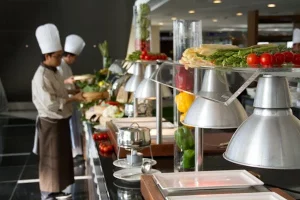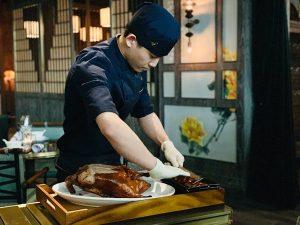In the dynamic world of professional kitchens, the sous chef plays a vital role, serving as the second-in-command and often the backbone of the culinary team.
With a blend of culinary expertise, leadership skills, and a passion for food, sous chefs are essential to the kitchen.
In this blog post, we’ll take a closer look at what it means to be a sous chef.
Who’s a sous chef?

The term “sous” is French for “under” or “below,” which aptly describes the position of a sous chef as being just under the executive chef. This role is pivotal in the culinary world. However, becoming a sous chef is not an overnight achievement; it’s a senior role that requires substantial hands-on experience.
A sous chef must possess a unique blend of culinary skills, as well as multiple soft skills. They are typically responsible for assisting the executive chef in various aspects of kitchen management, including menu planning and staff supervision.
One of their primary roles is to ensure the quality and consistency of dishes, a task that requires focus and meticulous attention to detail.
Responsibilities

The responsibilities of sous chef roles are diverse and demanding, reflecting their position in the kitchen hierarchy. The specific responsibilities of a sous chef may vary depending on the size and organizational structure of the restaurant. Some of the primary responsibilities typically include:
-
Kitchen management
Sous chefs are responsible for overseeing the day-to-day operations of the kitchen and managing the kitchen. This includes supervising kitchen staff and ensuring compliance with health, safety, and food hygiene regulations in the kitchen.
-
Menu planning
Executive chefs typically collaborate with sous chefs when planning menus. They may be responsible for creating new dishes, testing recipes, and ensuring that menu items are both innovative and profitable.
-
Food preparation
Sous chefs are involved in food preparation, including butchering meats, preparing sauces, and cooking dishes to order. They must ensure that all food is prepared to the highest standards of quality and presentation.
-
Staff training and development
Sous chefs play a key role in training and developing kitchen staff. They may be responsible for teaching new cooking techniques, overseeing staff performance, and providing feedback and guidance as needed.
This is especially important during onboarding, as training at this stage establishes a great foundation for the rest of their employment.
-
Inventory management
Sous chefs are often responsible for managing kitchen inventory, including ordering ingredients and supplies, monitoring stock levels, and minimizing food waste.
Skills and qualifications

Becoming a sous chef requires a unique set of career skills and qualifications. Some of the key skills essential for success in this role include:
-
Culinary skills
A sous chef must have excellent culinary skills and a strong knowledge of food preparation techniques. They should be able to prepare a wide variety of dishes to a high standard. These skills are essential since they must set an example for everyone else in the kitchen.
-
Leadership
Sous chefs are responsible for leading and managing kitchen staff, so strong leadership skills are essential. They should be able to motivate and inspire their team to achieve the best results.
-
Organizational skills
Sous chefs need to be highly organized, as they are often responsible for managing inventory, creating schedules, and overseeing kitchen operations. They should be able to multi-task and prioritize effectively.
-
Communication skills
Sous chefs need to have strong communication skills in order to effectively communicate with their team and with other members of the kitchen staff. Communication skills are also crucial when interacting with upper management, as that’s part of their role.
In case there’s a conflict within the team, they must be able to successfully resolve it without escalating.
In terms of formal education, most sous chefs have a culinary degree or certificate and hospitality degree from a reputable culinary school. However, hands-on experience is also crucial in this role. Many sous chefs start out as regular cooks and work their way up by gaining experience and developing their skills.
Work Environment

Kitchens overall are fast-paced and demanding work environments, requiring staff to be on their feet for long periods of time. Sous chefs often work in hot, noisy, and crowded kitchens, where they must be able to handle the pressure and stress of a busy service as well as these physically demanding conditions.
Sous chefs typically work full time, and their hours may vary depending on the needs of the restaurant. They often work evenings, weekends, and holidays, as these are the busiest times for restaurants.
Additionally, sous chefs may be required to work overtime during peak periods. They will frequently work the opposite shift of the executive chef to provide consistency in the kitchen and ensure the meals meet the highest quality standards.
Despite the challenges, many sous chefs find the work environment to be exciting and rewarding. They enjoy the creativity of the job as well as the opportunity to work with a talented team of chefs and kitchen staff. The fast-paced nature of the work means that no two days are ever the same, keeping the job interesting and engaging.
Conclusion
Being a sous chef requires a unique blend of skills, qualifications, and passion.
To become successful, one must possess excellent culinary skills, strong leadership abilities, and effective communication skills. While a formal culinary education is valuable, hands-on experience is equally important in this role, if not more.
Whether you’re an aspiring chef or simply curious about the culinary world, the role of a sous chef offers a glimpse into the thrilling and rewarding world of professional kitchens.
Author Profile

- Passionate education content creator and designer, contributor, writer and content marketing allrounder.
Latest entries
 careerMarch 3, 20263 Common Mistakes Students Make on their UK University Application
careerMarch 3, 20263 Common Mistakes Students Make on their UK University Application language learningMarch 2, 2026How to Prepare for the JLPT: Tips and Resources for Exam Success
language learningMarch 2, 2026How to Prepare for the JLPT: Tips and Resources for Exam Success learningDecember 17, 2025How to make School Handouts more Accessible for all Learners
learningDecember 17, 2025How to make School Handouts more Accessible for all Learners learningDecember 15, 2025Why Critical Thinking and Evaluation Skills Matter in Psychology Revision
learningDecember 15, 2025Why Critical Thinking and Evaluation Skills Matter in Psychology Revision







